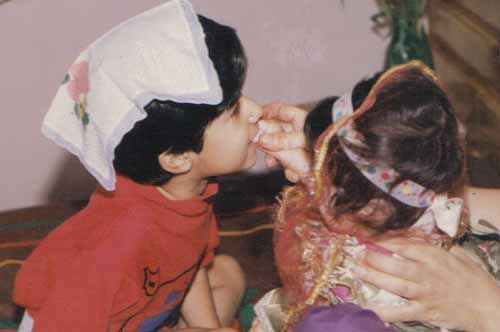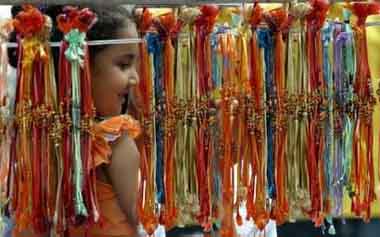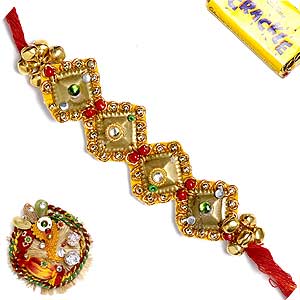 |

|
 |

|
 |
|
|
 Rakshabandhan is a very special Indian festival, the celebration of the special bond between a brother and a sister. Sisters tie a special band on their brothers' wrist on the day of Rakhi as a mark of affection. This thread, which pulsates with sisterly love and sublime sentiments, is rightly called the 'Rakhi'. It is a way of telling your
brother that you'll never forget how he teased you about everything, yet
fought with those who spoke a single word against you and how you bid him
farewell with a smile, and only he saw those tear drops in your eyes.
Around mid-August, on Shravan Purnima, Hindus all over celebrate Raksha Bandhan. "Raksha" means protection, "bandhan" means bound or binding. The festival is also known as Balev. As per the traditions, the sister on this day prepares the pooja thali with diya, roli, chawal and rakhis. She worships the deities, ties Rakhi to the brother(s) and wishes for their well-being. The brother in turn acknowledges the love with a promise to be by the sisters' side through the thick and thin and gives her a token gift. Raksha Bandhan tightens the bong of love between the sister and brother.  Rakshabandhan if taken in true sense has a much broader perspective; the festival encompasses true sense of peace and brotherhood. The values propagated by the occasion if inculcated by all human beings can bring the much-needed relief from the ongoing violence and mistrust.
The preparations begin much in advance. Some twenty days ahead of the festival you can see colorful rakhis in the market. Girls start the shopping and preparations quite early. The shop for new clothes and buy rakhis specially the ones that have to be sent to the brothers staying far. The sweet shops, the garment shops, gift shops, all are flooded with things to attract people. On the Raksha Bandhan day, the festivities start by the day break. Every one gets ready early and gathers for the worship of the deities. After invoking the blessings of the Gods, the sister performs brotherís arti, puts tika and chawal on his forehead and ties Rakhi amongst chanting of mantras. Then she gives him sweets and gifts. The brother accepts her offerings and vows to take care of her and be by her side in the time of need. As a token he gives the sister a return gift and sweets.  For those siblings who for distances are not able to meet, it is a day for remembering the bygone time when the day was celebrated together. Emotions are expressed through e mails, e cards, rakhi greeting cards, and rakhis through internet or mail. Nothing on this day can stop the overflowing emotions. Congregations like Rakhi Mohotsavas were started by Rabindra Nath Tagore in Shantiniketan. He started this to propagate the feeling of brotherhood amongst people. This invoked trust and feeling of peaceful coexistence. The festival for them is a symbol of harmony. The tradition continues as people tie rakhis to the neighbours and close friends. It is a festival denoting National sentiments of harmony. |